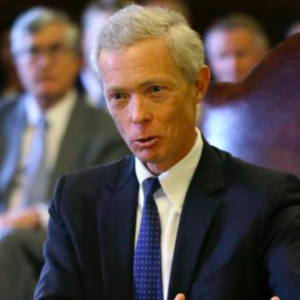“Are you now, or have you ever been, a Republican?”
Democrats on the Executive Council didn’t ask Attorney General Gordon MacDonald that specific question on Wednesday. But they came close.
MacDonald, the mild-mannered attorney who was unanimously confirmed as AG by the Executive Council in 2017, is Gov. Chris Sununu’s pick to be the next chief justice of the N.H. state supreme court. The reaction from New Hampshire Democrats has been an all-out, partisanship-based attack on his nomination. Democrats readily concede that MacDonald is smart, qualified and ethical.
The problem is that he’s in the wrong political party.
During Wednesday’s hearing, Councilor Debora Pignatelli claimed MacDonald is part of “a political party which, in my opinion, has demonstrated a very poor record on access to health care, voting rights, gerrymandering, campaign finance, gun safety, and many other issues.
“Please…convince me why I, a moderate Democrat, should be comfortable with you serving in our highest court and possibly being the deciding vote on many issues of the day,” Pignatelli asked.
Former chair of the New Hampshire Democratic Party Kathy Sullivan called out MacDonald for being a donor to his own political party. “Gordon MacDonald has been a consistent & significant contributor to anti-choice candidates, e.g. Ovide Lamontagne, Wendy Long and Frank Guinta, as well as NH Republican Party,” she tweeted.
And in a classic “guilt by association” technique, Pignatelli raised questions about the fact that MacDonald was once a staffer for U.S. Senator Gordon Humphrey, a pro-life Republican who hasn’t held office since 1990. Councilor Andru Volinsky picked up on this line of attack as well. “During the time you worked with Sen. Humphrey did you ever publicly articulate a more balanced approach to abortion rights than Sen. Humphrey’s,” Volinsky asked–an odd question for a staffer whose job was to represent the senator’s politics, not the other way around.
Volinsky’s political stake in the MacDonald nomination is clear: He’s running for governor, and any vote cast in support of a Sununu nominee could be problematic in a Democratic primary. Unfortunately, not only did Volinsky vote to make MacDonald attorney general, he said at the time he was confident MacDonald would “do a good job.” His then-colleague, Rep. Chris Pappas, concurred: “I have confidence that Gordon MacDonald will be a great attorney general.”
But the broader strategy of the state Democratic party is less clear. Current chairman Ray Buckley has gone after MacDonald aggressively, calling him “hyper-partisan,” “a dangerous choice for New Hampshire,” and repeatedly referring to him as “anti-choice.”
Democrats are even running a digital ad attempting to link Granite State yankee MacDonald to southern states that have recently passed pro-life legislation.
“Last I heard, Governor Sununu was still the governor of New Hampshire — not Alabama,” said Holly Shulman, spokesperson for the New Hampshire Democratic Party.
But if MacDonald is, in fact, pro-life–though Democrats have yet to produce any statements from him confirming their accusation– wasn’t he pro-life when Volinsky and Pappas made him AG?
And this is the Democrats’ fundamental problem: Nobody is buying their attacks.
More than 120 attorneys, Democrats and Republicans, have signed a letter endorsing him. Prominent Democratic lawyers and judges are backing him, including Chief Justice John Broderick; Larry Vogelman, former counsel to Planned Parenthood; John Tobin of N.H. Legal Aid; and former Democratic Gov. John Lynch’s legal counsel Kate Hanna.
As Democratic activist and MacDonald booster attorney Jay Surdukowski noted, “Not one practicing attorney or judge spoke out against this nomination. Speaks volumes about Gordon MacDonald’s integrity and character amongst his peers in the Bar and the judges he’s been before on the Bench.”
All of which makes the aggressive attacks, particularly on the issue of abortion, odd and off-putting. At one point, Pignatelli laid out a long, confusing hypothetical about what would happen in New Hampshire if the Supreme Court one day overturns Roe v. Wade and then a future legislature passes a total ban on all abortion and a governor signed it into law—what would he do as chief justice?
It’s a bizarre scenario, particularly for a state like New Hampshire that has no laws restricting abortion procedures up to the day of birth, and it left MacDonald (and based on their reaction, everyone in the audience) befuddled. What should a judge do in that impossible scenario? MacDonald’s answer essentially came down to “I would follow precedent and the law.”
What else is he supposed to do?
Democrats are trying to argue that unless MacDonald is affirmatively pro-abortion, regardless of the law, he’s a threat to abortion rights. It’s an argument people who are serious about the law don’t take seriously.
Sullivan concedes that “no one is saying that [MacDonald] isn’t a good lawyer or a good person,” she told NHJournal.
“All I want is a thorough vetting and real consideration of Attorney General MacDonald’s entire record before the vote. If a Democratic governor had nominated a major party donor who had served as party legal counsel, and had been an officer of the ACLU New Hampshire, as well as a former staffer for a Democratic senator, Republicans would be asking analogous questions – especially if the Democrat had no prior judicial experience.”
Perhaps. But is a Republican governor appointing a Republican to the courts really “a dangerous choice?”
Thus far, Democrats haven’t made their case.

